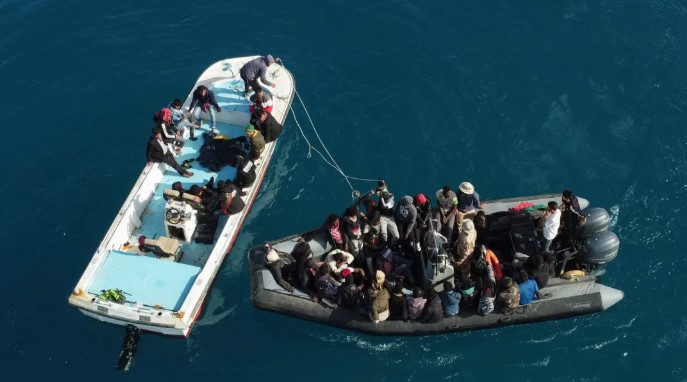Italy and Greece are warning their European and NATO allies about a serious security threat coming from Libya. They believe other countries are too focused on the war in Ukraine and are ignoring the dangers that are rising just across the Mediterranean Sea.
Libya Becomes a Growing Threat to Europe
In recent months, the number of migrants arriving in Europe from Libya has increased sharply. Italian and Greek officials are especially worried because this rise in migration is not just a humanitarian issue—it’s also a matter of national and regional security.
Russia’s growing influence in Libya is of special concern to Rome. In addition to providing Libyan forces with armaments, Moscow is considering building a new naval base in the northeastern port of Tobruk. Russia might have a more powerful military presence in the Mediterranean as a result.
Greece is under duress as well. Two warships have been dispatched by Athens to patrol off the coast of Libya. Greek leaders believe that Turkey is working with Libyan authorities to divide up the sea around the Mediterranean. These actions involve waters near Crete, and Greece says they break international maritime laws.
From Europe to Cuba: Guantánamo Bay Set to Hold 9,000 Undocumented Migrants in Secret Transfe
Italian Foreign Minister Antonio Tajani called Libya “an emergency that Europe must address together.” But efforts to build European unity on this issue have not gone well.
Diplomatic Chaos as Libya Migration Crisis Grows
A recent EU visit to Libya ended in embarrassment. Italian, Greek, and Maltese ministers visited Benghazi, in eastern Libya, along with EU Migration Commissioner Magnus Brunner. However, they were deemed “persona non grata,” or not welcome, by the soldiers of Libyan leader Khalifa Haftar. Without providing an explanation, the officials were instructed to depart.
Russia’s growing influence in Libya is the root cause of this crisis. Moscow is exploiting Libya as a focal point for its African strategy, according to a warning from an EU ambassador. A network of smugglers linked to Russia is reportedly helping the Kremlin get around Western sanctions and use migration as a tool of pressure on Europe.
Both Italy and Greece believe that solving Libya’s problems requires help from major powers like the United States and France. But so far, there has been little interest or action from these countries.
Meanwhile, the Greek government is taking strong steps at home. It recently announced that it would stop processing asylum applications for three months for people arriving by sea from North Africa. Prime Minister Kyriakos Mitsotakis said this was an emergency measure to deal with the sharp rise in migrant arrivals.
Europe’s Financial Bermuda Triangle: 800 Liechtenstein Trusts Abandoned in Sanctions Fallout
Migrant Spike Triggers Tension Across the Mediterranean
Since the beginning of the year, over 9,000 migrants have reached Crete from Libya. That is almost twice as many as for the entire previous year. To halt the influx, Greece sent out two warships in late June. However, authorities are concerned that these patrols would actually incite people to dive into the ocean in the hopes of being saved. More than 2,000 migrants arrived in Crete just last week.
Greece is also facing criticism from within. Some say the government hasn’t paid enough attention to Libya in recent years, making the current situation worse.
Across the central Mediterranean, migrant crossings are up by 7 percent this year—mostly from Libya. In contrast, crossings in other regions have dropped by 20 percent. Italy is concerned that Greece’s strict rules might push more migrants toward Italian shores.
“We are concerned about the situation in Libya and the recent increase in irregular departures,” an EU spokesperson said, confirming the worry.
Still, it’s not clear how Europe will respond. Some diplomats thought that offering money to Libyan authorities might help, like the EU’s 2023 deal with Tunisia. But Libya is much more unstable, with many rival militias making such a deal unlikely to work.
Russia’s Military Role Expands in Libya
Recently, a military parade in Benghazi showed Russian weapons being used by Haftar’s forces. This added to fears that Russia is trying to build a stronghold in Libya.
Following Bashar al-Assad’s overthrow, Russia’s lease at Syria’s Tartus port expired. The foreign minister of Italy has now issued a warning that Libya may become Moscow’s new regional stronghold.
Russia also intends to install missile systems in Sebha, a Haftar-controlled town in southern Libya, according to news source Agenzia Nova. These rockets could potentially target Europe.
Experts say it’s unclear whether Russia actually has that power yet. But they agree that Russia already uses military bases in Libya for logistics. This means that even without missiles, those bases could still threaten Europe.
So far, Russia has mostly used Libyan bases to support its actions in other African countries. These operations are led by the Africa Corps, a group tied to Russia’s defense ministry.
Some European officials fear that Russia might use migration from Libya as a new weapon, just like it did in the past when it pushed Middle Eastern refugees through Belarus into Poland.
US Troop Reduction Plans Raise Serious Concerns in Europe
Still, not everything is going Russia’s way. A diplomat noted that the war in Ukraine is draining Russia’s funds, causing tension with Libyan militias due to unpaid dues.
Experts say Russia may not run migrant smuggling directly but could influence the groups involved.
Italy and Greece are finding it difficult to get support despite growing worries. Italy and France recently met and agreed on the threat, but they couldn’t agree on a solution.
Diplomatic discussions about Libya have increased, but not much has been done since. The United States is concentrating on the Pacific, while France is still being careful.
Africa was not even mentioned in the June 25 NATO declaration, therefore Italy and Greece were left to handle the situation on their own.
